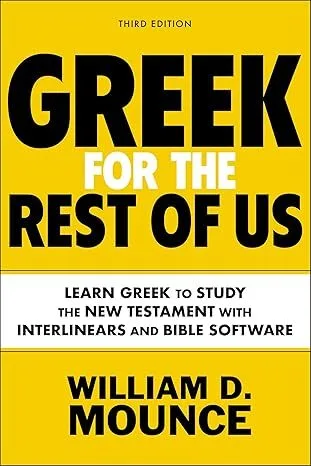Pronunciation Guide: an-ak-lee’-no
Basic Definition

Key Information
ἀνακλίνω

Strong’s Entry
g347
Strong’s G347: ἀνακλίνω (anaklino) fundamentally means to recline, especially at a meal, or to lay something or someone down. In ancient Mediterranean dining customs, it specifically refers to the practice of reclining on one’s side at a formal meal or banquet. This posture was a sign of freedom, intimacy, and celebration, particularly significant in the context of fellowship meals and messianic banquet imagery.
Etymology and Morphology
- Compound word from ἀνά (ana, “up, back”) + κλίνω (klino, “to recline, rest”)
- Primary verb
- Used predominantly in narrative passages, especially in contexts of meals and rest
- Common in fellowship and kingdom contexts
- Appears in both literal and metaphorical applications
ἀνακλίνω Morphology:
- ἀνακλίνω (present active indicative) – I cause to recline
- ἀνακλῖναι (aorist active infinitive) – to recline
- ἀνέκλινεν (aorist active indicative) – he/she reclined
- ἀνακλιθήσονται (future passive indicative) – they will be made to recline
- ἀνακείμενοι (present middle/passive participle) – reclining ones
Origin & History
The word ἀνακλίνω emerged from classical Greek dining customs where the proper posture for formal meals was reclining on one’s left side on a couch (κλίνη, kline). In Xenophon’s Symposium, he describes the custom of reclining at banquets as a mark of sophistication and leisure. The term gained additional significance in the Septuagint, where it appears in contexts of rest and divine provision, such as in the Psalms.
The compound structure with ἀνά (ana) adds the nuance of “back” or “up” to the basic meaning of reclining, suggesting a deliberate positioning or arranging of oneself or others in a reclining position. This usage carried forward into Koine Greek, where it became particularly associated with fellowship meals and eschatological banquet imagery.
Expanded Definitions & Translation Options
- To cause to recline, especially at a meal
- To lay down (particularly in contexts of rest)
- To place in a reclining position
- To seat (at a banquet)
ἀνακλίνω Translation Options:
- “to recline at table” – Most precise for formal dining contexts
- “to lay down” – Appropriate for contexts involving rest
- “to seat (at a feast)” – Useful for formal banquet settings
- “to make recline” – When emphasizing the causative aspect
- “to position for dining” – For cultural-contextual clarity
Biblical Usage
In the New Testament, ἀνακλίνω appears most prominently in contexts of fellowship meals and kingdom parables. Its first appearance in Matthew 8:11 presents a powerful image of Gentiles reclining at the messianic banquet with Abraham, Isaac, and Jacob. This usage establishes a significant theological connection between the act of reclining and participation in God’s kingdom.
The word appears in both literal contexts, such as Jesus’ feeding miracles, and metaphorical passages describing the kingdom of heaven. This dual usage creates a rich theological tapestry linking present fellowship meals with the anticipated messianic banquet.
- “Many will come from east and west, and recline at the table [ἀνακλιθήσονται] with Abraham, Isaac and Jacob in the kingdom of heaven” Matthew 8:11
- “Then He commanded the people to sit down [ἀνακλιθῆναι] on the ground” Matthew 15:35
- “And they sat down [ἀνέκλιναν] in groups” Mark 6:40
- “And she gave birth to her firstborn son; and she wrapped Him in cloths, and laid [ἀνέκλινεν] Him in a manger” Luke 2:7
- “And He directed them to have everyone sit down [ἀνακλῖναι] in groups” Luke 9:14
Cultural Insights
In the ancient Mediterranean world, the position of reclining at meals was deeply significant. While everyday meals might be eaten while sitting, reclining was reserved for special occasions and formal banquets. The host would arrange guests in a specific order, with positions of honor being closest to the host. This custom illuminates many New Testament passages, including the feeding miracles where Jesus had the crowds recline in groups, effectively treating them as honored guests at a divine banquet.
The Jewish practice of reclining at the Passover seder emerged from this broader cultural context. The rabbis taught that even the poorest person in Israel should recline at the Passover meal as a symbol of freedom, contrasting with the slavery in Egypt where their ancestors ate in haste while standing. This adds profound meaning to Jesus’ use of ἀνακλίνω in the feeding miracles and kingdom parables.
Theological Significance
The use of ἀνακλίνω in the New Testament creates a powerful theological connection between present fellowship meals and the eschatological banquet. When Jesus commands crowds to recline for His miraculous feedings, He’s not merely arranging them practically but symbolically treating them as guests at a messianic banquet, foreshadowing the great feast to come.
The appearance of ἀνακλίνω in Luke 2:7 regarding the infant Messiah being laid in a manger creates a poignant contrast – He who would invite others to recline at His kingdom banquet first had to be laid in a humble feeding trough. This demonstrates the profound condescension of the incarnation and the pattern of humility before glory in God’s kingdom.
The promise in Matthew 8:11 of many coming from east and west to recline with the patriarchs reveals God’s heart for including Gentiles in His kingdom promises, breaking down barriers between peoples and establishing a new community of faith.
Personal Application
Understanding ἀνακλίνω should transform how we view both our fellowship meals and our ultimate hope. When we gather for communion or share meals with other believers, we’re not just satisfying physical hunger but participating in a foretaste of the messianic banquet. The position of reclining represented freedom, honor, and intimate fellowship – all of which we have in the Messiah.
This word also challenges us to consider how we treat others at our tables. Just as Jesus commanded the crowds to recline, treating them as honored guests regardless of their status, we too should practice radical hospitality that reflects the inclusive nature of God’s kingdom.
Related Words
- κατακλίνω (kataklino) – to make recline, especially at meals; emphasizes the downward motion of reclining. See G2625
- ἀνάκειμαι (anakeimai) – to recline as a guest; often used in similar dining contexts. See G345
- κλίνω (klino) – to bow, decline, lay down; the root verb without the prefix. See G2827
- συνανάκειμαι (synanakeimai) – to recline together at meals; emphasizes shared fellowship. See G4873
Did you Know?
- In ancient Jewish weddings, the groom’s parents would often go to great expense to provide proper reclining couches for the wedding feast, as this was seen as essential for a proper celebration. The inability to provide such accommodation could be grounds for postponing the wedding.
- Archaeological discoveries of Roman triclinia (dining rooms) show that the typical arrangement allowed for 9-12 people to recline in a U-shaped configuration, with the host typically positioning honored guests to his right. This arrangement helps us understand the dynamics of the Last Supper and other biblical meal scenes.
- Modern Orthodox Jews still maintain the tradition of reclining at the Passover seder, typically leaning to the left while drinking the four cups of wine and eating the matzah, physically reenacting the freedom symbolized by ἀνακλίνω in ancient times.
Remember This
ἀνακλίνω embodies both the present joy of fellowship with the Messiah and the future hope of reclining at His heavenly banquet, where all barriers will be broken down and God’s people will feast together in perfect unity.
Note: While this entry strives for accuracy, readers engaged in critical research should verify citations and keyword occurrences in their Bible translation of choice. For Biblical citations, the F.O.G Bible project recommends Logos Bible software.
Strong's g347




